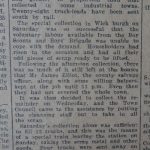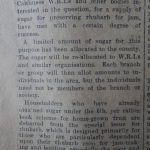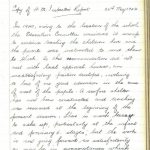On 1 August Hitler decreed that the date for the invasion of Britain would be Sunday 15 September. German raids continued in the Channel and towns, cities and airfields across the UK were bombed, including Norwich and the Forth Bridge, while British ships laid down mines around the coast of England and Scotland. The cost to the Luftwaffe was high, however; since 10 July they’d lost 153 planes shot down to the RAF’s 73. Also this week, the USSR annexed Bessarabia, Northern Bukovina and Lithuania, and Italian forces invaded British Somaliland.
 Meanwhile, in Caithness, people were responding to the national appeal for scrap metal (what we would now call recycling). As the John O’Groat Journal reported, across the county 100 tons of scrap metal had been collected and sent south by rail, filling 28 railway trucks. (Given that it took 18 tons of metal to build a tank, and 900 tons to build a destroyer, you could say that Caithness had contributed 5 tanks, or one-ninth of a ship, to the war effort!)
Meanwhile, in Caithness, people were responding to the national appeal for scrap metal (what we would now call recycling). As the John O’Groat Journal reported, across the county 100 tons of scrap metal had been collected and sent south by rail, filling 28 railway trucks. (Given that it took 18 tons of metal to build a tank, and 900 tons to build a destroyer, you could say that Caithness had contributed 5 tanks, or one-ninth of a ship, to the war effort!)
Sugar rationing had been introduced in January, although householders who used home-grown fruit to make their  own jam got an additional allowance. Now it was the turn of the late summer crops, rhubarb and plums. You could apply to your grocer for a 2lb. sugar ration for fruit, but in the case of rhubarb priority was to be given to “those who are particularly dependent on their rhubarb crop for jam-making and bottling, especially the poor and more deserving cases”.
own jam got an additional allowance. Now it was the turn of the late summer crops, rhubarb and plums. You could apply to your grocer for a 2lb. sugar ration for fruit, but in the case of rhubarb priority was to be given to “those who are particularly dependent on their rhubarb crop for jam-making and bottling, especially the poor and more deserving cases”.
 Here’s an interesting fact we came across in the school records. Ackergill is a small community a mile or so northwest of Wick, overlooking the coast, close by the airport, and in June 1940 the village school had closed for the summer holidays, along with all the other schools in the county. But unlike them, Ackergill didn’t reopen until August 1941. An Inspector’s report tells the story: “In 1940, owing to the location of the school [i.e., so close to the airfield], the Education Committee considered it unsafe to continue teaching the children here, and the parents were instructed to send them to Wick. As this recommendation did not meet with local approval, however, an unsatisfactory position developed, involving a loss of one year’s education in the case of most of the pupils.” (As the head teacher noted when the school reopened: “Pupils are very backward from being so long away”.)
Here’s an interesting fact we came across in the school records. Ackergill is a small community a mile or so northwest of Wick, overlooking the coast, close by the airport, and in June 1940 the village school had closed for the summer holidays, along with all the other schools in the county. But unlike them, Ackergill didn’t reopen until August 1941. An Inspector’s report tells the story: “In 1940, owing to the location of the school [i.e., so close to the airfield], the Education Committee considered it unsafe to continue teaching the children here, and the parents were instructed to send them to Wick. As this recommendation did not meet with local approval, however, an unsatisfactory position developed, involving a loss of one year’s education in the case of most of the pupils.” (As the head teacher noted when the school reopened: “Pupils are very backward from being so long away”.)
Finally this week, Alexander Robertson and Sons of Wick, dealers of Morris cars, ran an advertisement which  seems, in retrospect, a touch optimistic: “You’ll want a new car after the war”, it says; “It’s cheaper to buy it NOW!” It’s poignant to think that no one at the time could have imagined the war still had another five years to run…
seems, in retrospect, a touch optimistic: “You’ll want a new car after the war”, it says; “It’s cheaper to buy it NOW!” It’s poignant to think that no one at the time could have imagined the war still had another five years to run…
